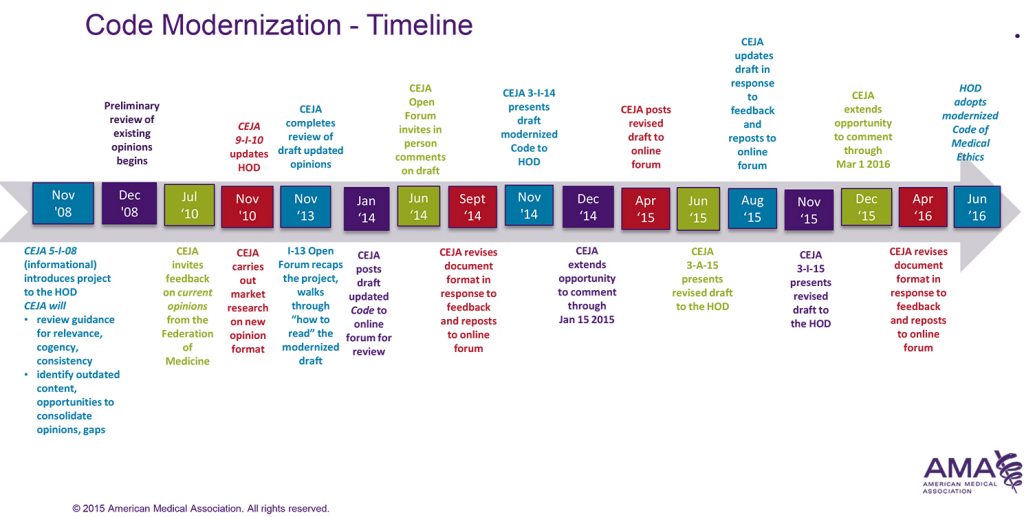Eight years ago, the American Medical Association’s (AMA) Council on Ethical and Judicial Affairs embarked on a comprehensive review of the AMA Code of Medical Ethics. What emerged after years of hard effort, intensive feedback and thoughtful revisions was a modernized version of the guide, which the AMA House of Delegates voted to adopt in June 2016. It represents the first major update since 2001 of the Code of Ethics, which was first established at the inaugural AMA meeting in 1847.
Reasons for the Update
The modernization was conducted to “ensure physicians have useful and effective ethical direction that keeps pace with emerging demands, new technologies, changing patient expectations and shifting health care priorities,” the AMA said in a statement. When the review effort began, the Code of Ethics was deemed to be “fragmented and unwieldy” and “individual topics were difficult to find,” said the authors of a Journal of the American Medical Association viewpoint piece in September.1
“Ultimately, the [updated] code reflects the professional values of medicine,” says Audiey Kao, MD, PhD, vice president of ethics standards at the AMA.
A Careful Process
Dr. Kao also notes that the original nine principles of medical ethics as defined by the AMA were not altered in the modernized code. Rather, the updates removed outdated language and redundancies, evaluated for relevance the science and medical practices contained within it, and enhanced guidance where reviewers determined it to be unclear.
Out of respect for the accumulated knowledge collected in the code since its genesis, the Council updated opinions only when it “judged guidance to be significantly out of step with current best ethics, biomedical science or the structures of contemporary healthcare.”2
For example, language related to treating patients with HIV was broadened to cover patients presenting with any disease status. “It clearly dated to the early AIDS epidemic,” says Bette Crigger, PhD, director of ethics policy and secretary to the Council on Ethics and Judicial Affairs for the AMA. And it was updated to encompass the scientific advances in genetics since the 1990s. “It’s not that the ethics had necessarily changed,” says Dr. Crigger.
Adding Team-Based Care
The updates to the code also address gaps identified during the comprehensive review process. This includes adding team-based care to reflect changes to healthcare delivery.
According to the AMA, “teams are defined by their dedication to providing patient-centered care, protecting the integrity of the patient-physician relationship, sharing mutual respect and trust, communicating effectively, sharing accountability and responsibility, and upholding common ethical values as team members.” They are “the preferred method for providing coordinated, cost-effective, high-quality health care [sic] for patients.”
“Rheumatology is very multidisciplinary,” says rheumatologist Jane Kang, MD, MS, chair of the ACR’s Committee on Ethics and Conflict of Interest. “We interact with a lot of specialists and other healthcare providers. For us, it’s always important to interact with other members of the healthcare team.”
Other Additions & Considerations
The modernized Code of Ethics now also explicitly addresses advanced care planning. However, this addition was made in November 2016 at the interim AMA House of Delegates meeting, so is not yet reflected in printed versions of the code. Currently, the AMA is also considering opinion on the ethics of responsibility and competence in medicine.
“Physicians have the responsibility to be self aware and ask, ‘Am I, at this moment, able to provide safe care for this patient, being aware that when I am not, I have to consult a colleague, transfer the patient to a colleague or reschedule a procedure?’” says Dr. Crigger.
This applies not just to instances of substance abuse or mental health challenges, but also to instances in which physical challenges interfere with a physician’s ability to perform.
Dr. Crigger says updates continue to be considered and opinions adopted. “The code continuously evolves over time,” she says.
Streamlined & Organized
Since the review began, the process of including new opinions in the code has also been streamlined. The AMA adopted a uniform format to which all new opinions must adhere. Drs. Crigger and Kao hope it helps the code maintain the consistency that the previous version lacked.
The Code of Ethics was also organized into chapters—including patient-physician relationships, genetics and reproductive medicine, and research and innovation—making it easier to find topics of interest, and understand and apply them, says Crigger.
“It’s more clearly organized,” says Dr. Kang, who is interested in examining particular aspects of the updates and how they may overlap or impact the ACR Code of Ethics.3
Keeping Up
“There are always new therapies and advancements in medicine, which brings light to new ethical considerations. Regulations and codes then need to catch up with the rapidly evolving medical landscape,” says Dr. Kang. “In rheumatology, we have a lot of new therapies being investigated. As we have new treatments available, new ethical matters in research and clinical care will arise, so it makes sense to have an updated code.”
__________________________________________________________________________
Kelly April Tyrrell writes about health, science and health policy. She lives in Madison, Wis.
References
- Brotherton S., Kao A., Crigger B.J. Professing the values of medicine: the modernized AMA Code of Medical Ethics. Journal of the American Medical Association. 2016 Sep 13;316(10):1041–1042.
- American Medical Association. Feedback on the Modernized Code of Medical Ethics. American Medical Association. 2016 Dec [Unpublished].
- American College of Rheumatology. Code of Ethics of the American College of Rheumatology Inc. 2015 Feb http://www.rheumatology.org/Portals/0/Files/Code%20of%20Ethics.pdf.

